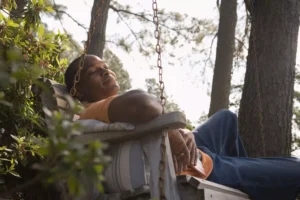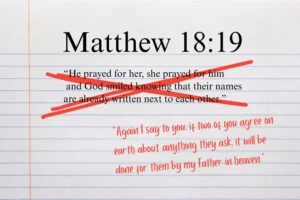Last year, God finally answered yes to my years-long prayer request for the “Big Thing.”
It doesn’t really matter what the Big Thing was. Maybe it was healing, a financial breakthrough, a reconciled relationship, a job or some other change in circumstance. Whatever it was, my waiting experience was like that of so many other people: a constant fight with the lingering fear that God was punishing me for wanting it too badly.
When we’re waiting for the answer to a major request, God’s apparent resistance sometimes makes no sense, because the big things we want are often legitimate—good things that most people hope for. And seeing those around us enjoying the very things we want serves as a reminder of what we’re missing. This drags us through a journey that can feel like a never-ending grieving process.
I’m reminded of Dr. Elisabeth Kübler-Ross’ model of the five stages of grief, which include denial, anger, bargaining, depression and acceptance. I went through all of them multiple times during my wait for the Big Thing—often in no particular order. But in my longing, the stage I found myself in most frequently was denial. This helped me survive the wait, but didn’t build true perseverance.
This Isn’t Happening
When I first began pursing my Big Thing, I assumed it would be mine relatively quickly. But then the months—and years—dragged on and the disappointments piled up. One thought terrified me: There’s nothing I can do to change this. God, no, please don’t do this to me.
In my desperation, I focused on the obstacles, most of which were beyond my control, and told myself I could change them if I just tried hard enough. But despite my herculean efforts to force the door open, I could hardly even get the knob to turn. And even when I made marginal progress and got the door cracked open, it slammed on my fingers. In those moments, denial caved in on itself, leaving me with a low-grade sense of anger at the reality I couldn’t change.
Finger Pointing
Scripture says, “Be angry and do not sin; do not let the sun go down on your anger, and give no opportunity to the devil” (Ephesians 4:26-27). Unfortunately, during my wait for the Big Thing, many suns went down on my anger, giving the devil plenty of opportunities to use it against me—especially the anger and guilt I felt toward myself.
I began to believe the wait was entirely my fault, generating a simmering feeling of self-loathing for all the things I might be doing to keep the Big Thing at bay. As Dr. Kübler-Ross says, “Guilt…is anger turned inward on yourself,” and that anger eventually led me to believe I was simply unworthy of the blessing. Worse yet, I feared that God was coldly and indifferently withholding it in order to teach me a lesson. That isolating thought inspired countless attempts to bargain with Him in order to get the Big Thing.
Let’s Make a Deal
God, I prayed many times, thank You for these circumstances. I’ve learned so much from them, and I’ll use these lessons the rest of my life. And while I didn’t explicitly say it, behind that prayer was the hope of a tradeoff: If I showed God that He had achieved some success in sanctifying me, maybe He would give me the Big Thing.
It didn’t work.
The years dragged on, and most of the time, the only result of my deferred hope seemed to be a great deal of suffering. To my dismay, there was plenty of Scripture to back up the idea that suffering was good for me.
There was one particular verse that gnawed at me more than any other: “[Jesus] learned obedience through what He suffered” (Hebrews 5:8). That verse would not let me escape the hard truth: If Father God used suffering for the benefit of His own Son, I probably wasn’t going to be able to barter my way out of it. As this reality sank in, I moved from desperation to despair.
My Anxieties Exposed
My darkest hours of waiting came when I got this close to having the Big Thing but then it eluded me. Even though the pain stung deeply, I didn’t want those around me to see me hurting. The wound was too tender. So when people asked, I often said the same thing I did when I was in a good place emotionally: “It’s really hard sometimes, but God is giving me grace to walk through it.” And while I truly believed those words in my head, the rest of me told a different story. In truth, I was quietly struggling with depression.
Off and on, I had a variety of physical symptoms from the depression, including migraine-like episodes. While I can only guess what other signs betrayed my stress, my closest friends picked up on them, saw through the façade, asked hard questions and gave me room to be vulnerable.
They were like Job’s friends who, as my former pastor Steve Blair points out, unfairly get a bad rap. Although those men gave horrible advice when they finally spoke, at least they didn’t immediately try to diagnose the problem or provide counsel. Instead, they simply showed up, sat down and silently grieved with Job for seven days (Job 2:11-13).
That was the kind of friendship I needed and received during the ache of waiting. And in the safety of those friendships, I was able to process my feelings, receive prayer and better maintain emotional health as I adjusted to the reality that the Big Thing would probably never be mine.
Desire or Idol?
After years of wrestling through grief, I began to see that I had essentially idolized the Big Thing, which polluted my perspective and decreased my capacity to see the evidence of God’s faithfulness in my life. In order to find freedom, I had to redirect my affections. Or as pastor Tim Keller explains in his book “Counterfeit Gods,” I needed to repent of idolatry. He says:
[Repentance] means appreciation, rejoicing, and resting in what Jesus has done for you. It entails joyful worship, a sense of God’s reality in prayer. Jesus must become more beautiful to your imagination, more attractive to your heart, than your idol. That is what will replace your counterfeit gods. If you uproot the idol and fail to “plant” the love of Christ in its place, the idol will grow back.
Repenting of making the Big Thing the object of my desire instead of my Lord was a process for me. But as I loosened my grip on it, I found Jesus in the waiting, and eventually discovered that the Big Thing wasn’t actually the Big Thing to me anymore. I could live without it. I could have joy in the suffering. I could move on with my life and envision different blessings God might have for me.
And then after all the waiting, through an unexpected twist of events, God gave it to me. He gave me the Big Thing. I’m still in awe.
I don’t think I finally got the Big Thing as a reward. Instead, I believe it was in God’s plan all along; I just had to wait much longer for it than I wanted. That’s not to say He didn’t use the suffering for my good. By the time I received it, I had already come to see that the Lord, my Shepherd, was the real Big Thing. He was the one who was restoring my soul after it appeared that my dreams had perished in the valley of the shadow of death (Psalm 23).
He had never been indifferent or unkind. He wasn’t watching everything unfold from a distance. Every single day of waiting, He was walking with me through the denial, anger and depression. He had compassion on me when I tried to bargain with Him, and He alone gave me the grace to accept my circumstances.
And now, with this long chapter finally in the rearview mirror, I can see that there was nothing wrong with my desire for the Big Thing. In fact, it was a good thing—not because it eventually led me to what I wanted, but because it led me to the Giver, who was more than enough all along.
Copyright 2017 Joshua Rogers. All rights reserved.










